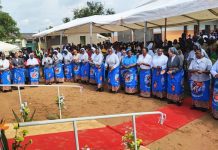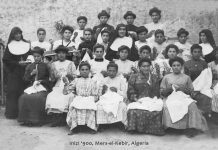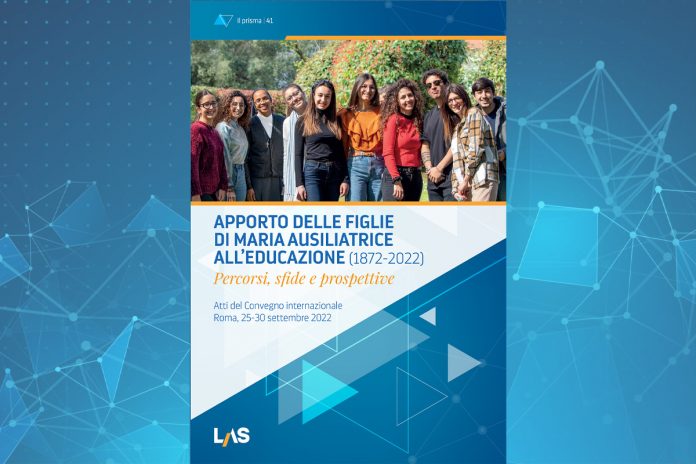Rome (Italy). Contribution of the Daughters of Mary Help of Christians to education (1872-2022). Paths, challenges, and perspectives is the title of the volume of the Acts of the International Convention celebrated in Rome from 25 to 30 September 2022, on the occasion of the 150th year of foundation of the Institute of the Daughters of Mary Help of Christians, promoted by the Institute and realized by the Pontifical Faculty of the Science of Education «Auxilium», networked with Provinces, FMA, young people, lay people, and with various institutions and academic centers, Salesians and others, of the world.
Published by LAS in Rome in October 2023 in The Prism Series edited by the Faculty, the text of 500 pages accompanied by several QCode that allow the use of the documentation available online, is, to say it with an effective expression of Mother Chiara Cazzuola, “a review of the commitment of the FMA in the educational mission from the humble origins of Mornese to today, in the 97 countries of the five continents where we are present and active.”
The publication, edited by Maria Teresa Spiga, Maria Spólnik, Martha Séïde, and Piera Ruffinatto, collects valuable contributions from scholars of the five continents, which, on the one hand, allow us to celebrate a history of the educational charism of the Institute that over 150 years has grown, enriching and spreading in sensitive environments and able to take care of the education of young people. On the other hand, they allow the FMA to project themselves with renewed hope towards the future in the Church and in the world of education with the awareness that the educational charism of the Institute will continue to be relevant wherever the younger generations are located. However, this requires a solid human and charismatic formation, in order to respond with creativity and flexibility to the new challenges of the youth context.
The text, in its triple thematic scan, follows the method adopted in the Conference, reflecting the “logic of dialogue, typical of the preventive method… listening to reality,” thus helping the reader to reappropriate the purpose of the event, that of “situating ourselves in the age change with the contribution of Salesian women’s education.”
The first part of the book: Historical journey through data and experiences, is introduced by a precious historiographical balance and a synthesis that outlines a panoramic picture of the Institute, indicating the diffusion of the communities, with people, houses, works in each country of presence in the entire chronological arc. Thus, some diachronic and synchronic elements of the activity of the FMA in the different geo-cultural contexts can be grasped; the attention to education between the lower and middle classes and the presence of women in childhood, pre-adolescence, and adolescence. The latter is also highlighted by the care of the profiles of some FMA creative interpreters of the Preventive System, some figures operating in the area, native and missionary, whose innovative forms of formal and informal education have contributed in various degrees also to the development of the sciences, pedagogy, and anthropology and, in general, of culture and education in society and in the Church.
The first section concludes with two significant interventions: diachronic reflection on the education of young people matured in the orientations of the Institute along 150 years of history and the presentation of a specific contribution to the education of women offered in the field of education sciences by the Faculty «Auxilium» of Rome.
The second part of the volume: In comparison with the challenges to education today, it is a significant source of interpretations and critical readings of some transversal scenarios and challenges present in contemporary life, which guide the mentality and influence the concrete behavior of individuals and societies, in particular with regard to the growth and education processes of the younger generations.
Faced with the complexity of the problems and respecting the internationality of the Institute, the attention to dialogue and listening is represented by the interventions of some scholars engaged in international organizations and by authoritative respondents of the five continents, that have allowed a kind of mapping of phenomena and allowed to emerge strengths, weaknesses, threats, and opportunities that affect education today.
The section closes with the reflection In the polyhedron of anthropologies, which shows how the anthropological question and its multiple facets today seem to be transversal to every problem related to education. Therefore, it challenges the charism and educational responses, asking the question of ‘how to be there’ in this polyhedron in a critical and proactive way by women, educators, religious, Salesians networked.
The third and final part of the publication is dedicated to Paths and perspectives for the future of education in the light of the Preventive System. The past and the present are projected towards the future, therefore the volume hosts research realized by an international team constituted by the FMA and other members of the educating communities of the world. The sharing of experiences and the reflection in numerous linguistic focus groups has certainly allowed us to acquire greater awareness of how some nuclei of the Preventive System are understood and lived in the mission today by the educational communities in the Institute throughout the world.
The educational presence is the object of reflection to which the last part of the third session of the volume is dedicated, which reports the interventions of the Round Table: Challenges and resources to re-found the Salesian educational ‘presence’ today. It is a rich material of study that brings together the voices of scholars, young professionals as well as FMA Past Pupils or people engaged internationally, who talk about the contribution of women in the humanizing transformation of society through a style of educational ‘presence’, of relationship based on the holistic vision of the person and education, proper to the Preventive System.
As Mother Chiara Cazzuola highlights in the conclusion to the book, “The Conference has not only celebrated history, but it is a starting point for a new journey of responsibility towards the young people entrusted to us, towards the Founders, towards the Church and the society in which we are inserted, in the various geographical and cultural contexts.”
Mother Chiara continues that for the FMA, education is an act of hope exercised in particular towards girls, therefore, “The promotion of women is particularly necessary to enable them to become protagonists in the construction of society, of the family, of the Church.”
Mother General ends with the appeal “to invest more decisively in the formation of the FMA and the laity who share the charism with us. This is the condition to be generative of life and hope for young people, and to be meaningful in society.”




















